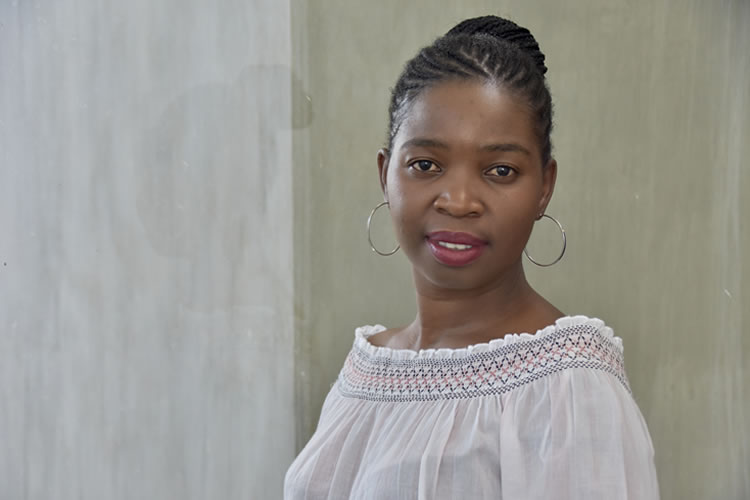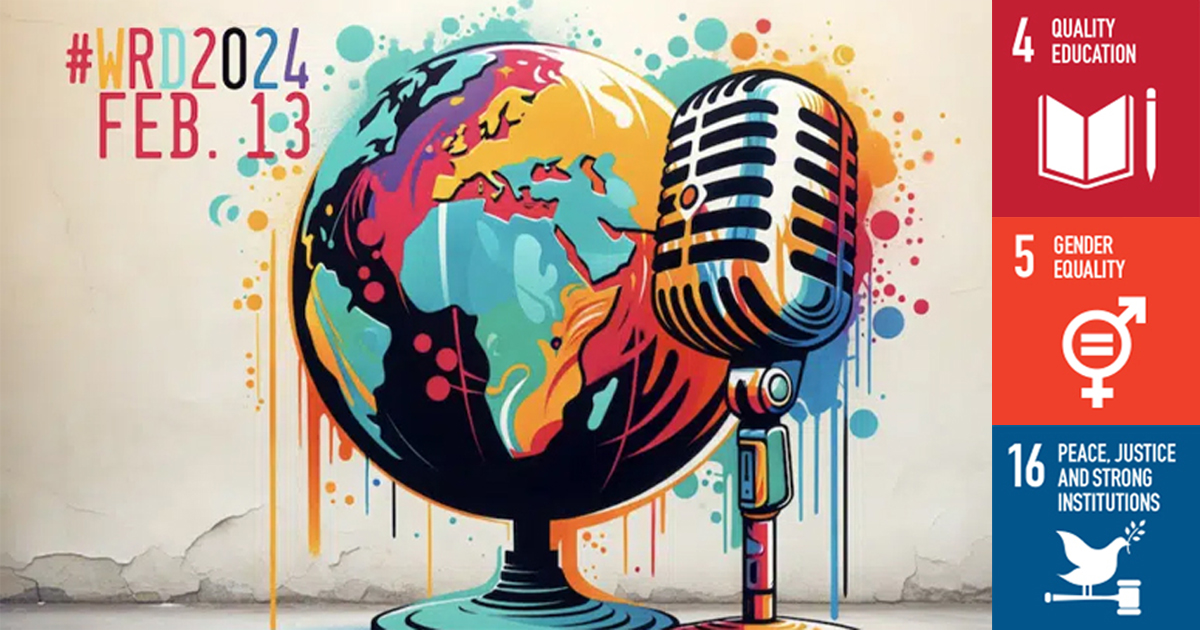The Centre for Human Rights, Faculty of Law, University of Pretoria (the Centre) stands in solidarity with the global community in observance of World Radio Day, celebrated on 13 February annually. World Radio Day emerged from a proclamation in 2011 by UNESCO member states before being endorsed by the UN General Assembly in 2013. The day is commemorated in recognition of the significance of radio as a medium for accessible communication across the globe.
On this occasion, the Centre acknowledges the remarkable resilience and enduring power of radio as a medium that transcends borders, connects communities, and fosters dialogue. The transformative impact of digital technologies on radio, enabling it to continuously adapt and thrive as a communication tool that captivates hearts and minds, is worth noting. Radio continues to be a valuable technology for communication. Its general accessibility and dependability make it one of the most widely utilised mediums for mass communication across the globe, and the single most widely used medium on the African continent. The Centre underscores principles 11 and 12 of the Declaration of Principles on Freedom of Expression and Access to Information in Africa (Declaration) - which promote media diversity and independence, respectively - as particularly important to the ability of the radio to facilitate freedom of expression and access to information.
Aligning with the 2024 theme, “Radio: A Century Informing, Entertaining, and Educating,” the Centre recognises the historical significance of the radio in the African context. Introduced by colonial authorities to disseminate propaganda and control information, the radio was repeatedly subverted as a tool for resistance, spreading culture and the voices of diverse opinions among communities. The radio has therefore long held an integral role on the continent in promoting and protecting freedom of expression and access to information. It remains a central tool for facilitating these rights, which are guaranteed under Article 9 of the African Charter on Human and Peoples' Rights and affirmed by Principle 1 of the 2019 Declaration of Principles on Freedom of Expression and Access to Information in Africa (the Declaration). The Declaration upholds freedom of expression and access to information as fundamental rights and cornerstones of democracy.
The Declaration expressly recognises the need to ensure freedom of expression and access to information for marginalised groups, including linguistic and cultural minorities. For underserved and remote communities such as rural areas, where access to modern communication tools may be limited, radio plays a pivotal role in bridging the information gap and fostering community connections, while also providing education and entertainment. For instance, community radio stations focus on engaging local communities on issues that affect them uniquely and increase access to information in areas where there have been barriers to this right.
They often operate in the local language, thus facilitating these freedoms for linguistic minorities. Being a platform for local voices to be heard and shared, radio serves as a catalyst for social cohesion, empowering communities to express their unique identities and share their lived realities. Through radio, these communities are informed about the world while being given a voice to contribute to public dialogue.
Considering this, governments, media organisations, and stakeholders are urged to continue investing in the expansion of radio infrastructure in rural areas, promoting community radio stations, and supporting initiatives that empower local voices. These approaches can fortify the resilience of rural communities, foster inclusive development, promote freedom of expression and access to information for all and ensure a more equitable and connected world. While acknowledging existing efforts to protect and support the sustainability of radio, the Centre advocates for heightened efforts by state parties to reduce barriers to the establishment of radio, including community radio, while concurrently backing initiatives that ensure their continual operation and sustainability. This is vital to the cultivation of meaningful public participation for all within a state.
In the era of digital advancements, radio has evolved beyond traditional airwaves to embrace the vast array of opportunities offered by the internet and mobile technologies. The radio landscape has been transformed by the emergence of online streaming, podcasts, social media engagement, and mobile apps. These developments have revolutionised interactions and how radio content is consumed. The transformation has enhanced interactions, personalised content, and contributed to inclusivity than ever before. The digital age has also ushered in the era of citizen journalism. Individuals are active actors in the generation and dissemination of news and information. Leveraging its immediacy and intimacy, radio continues to be a trusted source for timely updates and diverse perspectives, fostering a more informed and engaged citizenry. While celebrating the positive transformations brought about by the digital age, it is crucial to recognise and address the challenges accompanying these changes. The persistent digital divide poses a barrier, hindering some communities from accessing the digital benefits offered by radio. It is imperative for stakeholders to collaboratively work towards bridging this gap, ensuring that the advantages of radio in the digital age are accessible and inclusive for all.
As the continent navigates the ever-changing technology and digital landscape, it is important to continuously commit to the fundamental principles that define radio: authenticity, inclusivity, and the power to unite. As the evolution of radio through digital technologies is celebrated, it is essential to recognise the proliferation of information disorder that manifests as misinformation, disinformation, and malinformation among others. This challenge poses significant threats to the integrity and diversity of radio programming. It is therefore crucial for broadcasters and other content providers to uphold ethical and responsible reporting principles including accuracy and fact-checking.
As radio integrates and transforms in the digital world, it is also imperative to promote digital literacy; promote and protect the right to privacy; promote access to open radio content; embrace inclusion; and acknowledge and respond to vulnerabilities associated with the use of digital technologies.
The media landscape in many African states has experienced a loosening of governmental control and an increase in media diversity. The Centre expresses its apprehension about the repressive media landscape of many states across the continent, where suppressive legislation and state-controlled media severely inhibit the flow of information. In these states, radio and other media platforms are heavily censored and tightly monitored, with minimal sources of alternative information. As an integral tool for the dissemination of information, the radio can only effectively protect the rights outlined in the Declaration in an environment that fosters pluralistic media and allows the public access to independent sources of communication.
The Centre also notes with concern the prohibitive financial barriers that are an obstacle frequently faced by radio stations in Africa. Principle 12 of the Declaration asserts that registration fees should not be excessive for media, principle 13 states that public service media should be adequately funded, and principle 15 affirms that licensing for community media must be cost-effective. Across the continent, there are impediments to these principles. Expensive licensing has been used in some states such as Guinea Bissau and Zimbabwe as a form of governmental control over media. Sustainability challenges in some areas make stations vulnerable to interference through manipulative funding, and exorbitant fees hinder the development of smaller radio stations, with many struggling to survive. The Centre underscores the importance of affordability and the removal of financial barriers for media organisations as an important element of ensuring an environment that supports freedom of expression and access to information.
The commemoration of World Radio Day is an opportunity to reflect on the immense value that radio plays in facilitating the rights to freedom of expression and access to information on the continent and across the globe. In recognising this, African states must protect and promote the sustained value of the radio by supporting and facilitating its ability to communicate and engage with communities in an environment that promotes diverse and independent media. States should also adopt and enforce legislative measures that ensure the free flow of information and support efforts to sustain the value of the radio as an empowering medium for upholding our fundamental rights to freedom of expression and access to information.
For more information. please contact:

Expression, Information and Digital Rights Unit
Tel: +27 (0) 12 420 4199
Fax: +27 (0) 86 580 5743
hlengiwe.dube@up.ac.za

Intern: Expression, Information and Digital Rights Unit
Tel: +27 (0) 12 420 3810
Fax: +27 (0) 86 580 5743
kmbetse@uoguelph.ca


